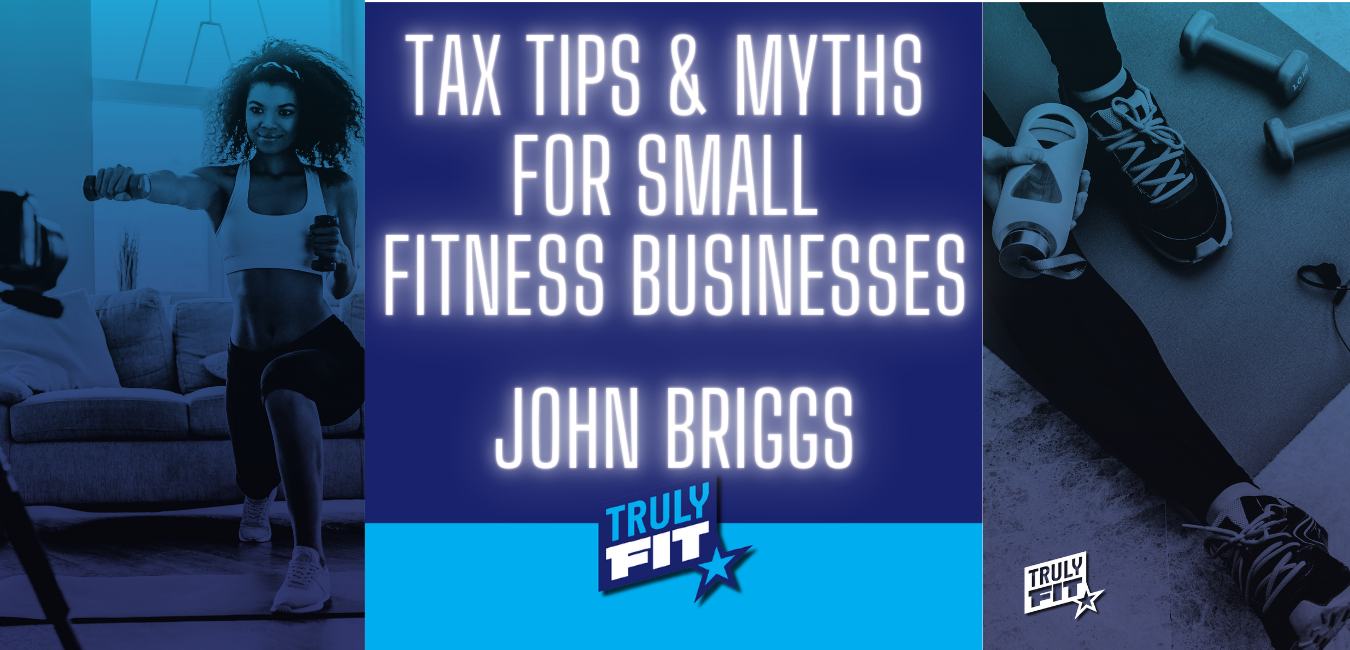
Tax Tips & Myths For Small Fitness Businesses: John Briggs

Guest: John Briggs
Podcast Release Date: 6/20/2021
CLICK FOR AUDIO OF PODCAST
Welcome to Trulyfit the online fitness marketplace connecting pros and clients through unique fitness business software.
Steve Washuta: Welcome to the Trulyfit Podcast. I am your host, Steve Washuta, co-founder of Trulyfit and author of Fitness Business 101. On today’s podcast, I have the pleasure of speaking with John Briggs. John Briggs is the founder and owner of insight tax and accounting and the author of profit first for micro gems. His accounting firm has more gym clients than any firm in the country. I go through a list of fitness business, tax-specific questions with john who answers them very thoroughly.
He gives fantastic information and insight into these questions. Whether you are a current gym owner, or a private independent worker, personal trainer, group fitness instructor, or you’re somebody who is seeking to eventually open up your own business of some sort, whether in-home or at a facility. This podcast is for you. You will take something from it. With no further ado, here’s john. JOHN, thanks for joining me Trulyfit podcast. I want you to give the listeners a background on who you are and what you do and your company.
John Briggs: Yeah, so I’m john Briggs, owner of insight tax. We service more small gyms than any other accounting firm in the country and have about 30 team members. I just love what we do. The focus is on tax cash flow strategies. Always with the focus on how does our client grow their wealth. Too often you get to tax people, for example, they’re just heavy on compliance. Compliance is easy. It’s a part of making sure that the decisions our clients are making actually grow their wealth and are better for their future.
John Briggs: We need to make sure their future can be bigger than their past. But man, we love what we do. We think the world’s a better place when business owners stay in business, especially fitness professionals. Not only are they have the benefit of being small businesses, which the economy sits on the back of the small business, they also improve the health of humanity. We all know that as health improves people’s lives, the quality of their life improves as well.
Steve Washuta: Yeah, and I have a zillion questions for you that I can think of right away, even after just saying that. But I think we’re going to start a little bit vague here. Eventually down the road, I’m going to have you back on to press you on a specific topic. Hopefully, my listeners come back to me and say, Hey, this is what we’d like to learn about. For now, let’s say you’re starting a fitness business. I know an LLC is important. Can you explain to me why and the tax implications surrounding that?
John Briggs: Yeah, and so there’s a couple of things to start with. This is one of like chicken or egg things like I don’t know which one to start with. So entity selection and LLC is an entity in the legal world. That’s how attorneys referred to it. That’s how the IRS refers to it. The right selection as a fitness professional is supercritical. Because if you don’t select the right one, you are automatically going to overpay in taxes is just that simple, because we have our income tax burden.
John Briggs: But depending on what you choose, you could have a larger self-employment tax burden. A lot of us in this world, I mean, there are hundreds of different taxes. But for the normal taxpayer who’s not really thinking about this all day, they usually just think about income tax. But the truth is, there are tons of taxes, self-employment tax is different than income tax. You have some ability with proper entity structuring to reduce self-employment tax.
John Briggs: For a fitness professional, it’s recommended that they have an S Corp. Now it’s important to clarify, LLC is you create with your state, LLC is don’t exist to the IRS. They make you classified as something that exists to them. So they have this status called S Corp. That’s only a tax status, you can’t actually set up an S corporation with your state. So thank you government for making things super confusing for all of us. So to your point, we usually recommend setting up an LLC because they are easier to set up.
John Briggs: I always recommend talking to an attorney familiar with your state laws though. But usually, the LLC is a simpler process to set up than a corporation. Then once that LLC is set up, you have to file a form with the IRS that says I have this LLC, but I want you to treat it as an S corporation.
John Briggs: Any accountant will be able to do that for you. You could DIY, do it yourself, if you want. It’s form 2553. So I would say though, now with all that context, to answer your question, I would consult with an attorney. Make sure the LLC makes sense for you in your state. Then usually, if you don’t want to pay an attorney to do it, you do have the right to set up that business yourself. Most states have an online, I would just google your state’s name, setup, LLC, and find the URL that ends in like a.gov.
John Briggs: There are lots of marketing companies out there that do a really good job of making it seem like you’re applying through the state, but you’re actually paying unnecessary fees. If you’re going to pay on this, if you’re going to pay unnecessary fees, I’d rather you pay an attorney to help you set it up. So, your state should have an easy way for you to set that up. Once it’s set up, file form 2553, with the IRS, and those are the steps you take to get your LLC set up.
Steve Washuta: Now I’m trying to recall a conversation I’ve had with my accountant. I think he had said something to the extent, and obviously correct me if I’m wrong, that you have a little bit of time before declaring? Is that correct?
John Briggs: It is correct from a technical standpoint. But I would say if you’re setting up your LLC like the goal is to make money right to have profit to have taxable income leftover. So, it doesn’t hurt you if your LLC is taxed as an S corp and you have a loss. You can have the same tax outcome as you would if you didn’t make the selection. But if you miss the window, it’s harder to get the IRS to accept it, or just there are a few more steps. However, there’s definitely a window from I set up my business, you have at least 45 days to mail off the form 2553 for the IRS to call it timely filed.
John Briggs: There’s always the backup, you can file the selection with the first tax return that you file. And they usually accept that other than those two scenarios, you can get it accepted. But it’s just more work that doesn’t need to happen.
Steve Washuta: So moving on to an employee or someone else who works under 10 40 for a fitness facility. That’s how I started out in the industry. What are some tax implications or concerns an employee who works under this 1040 form should be aware of?
John Briggs: Yeah, back before the tax reform of 2018, I would have given you a different answer. It would have been a little bit more positive. Unfortunately, as of right now, after-tax reform for 2018, if you’re a W2 employee, it basically is what it is. They used to allow you to take what they call unreimbursed employee expenses.
John Briggs: So, if I’m the coach, and I’m buying workout gear, and I have to travel somewhere other than the gym itself, or maybe there are certifications that I’m paying for, the IRS would have allowed you to take those as deductions. But because you’re an employee, they call them unreimbursed, employee expenses, 2018 eliminated those, basically, for everyone except the military. So for a fitness professional who’s a W2, you don’t get to use anything to reduce your income, whatever your W2 income is, it is what it is.
John Briggs: Now, that being said, if your gym owner is in a scenario where you have some autonomy, and flexibility in the way that you deliver the service they’re paying you to do, it is possible you’re actually an independent contractor versus a W2. Now I do know that as an independent contractor, you are going to have to take on the payroll tax burden that you don’t have to take on as a W2 person.
John Briggs: So, what we don’t often see self-employment tax or payroll tax, it’s the same thing we’re talking about is your FICA like Social Security, Medicare, the business pays half of that and then you as the employee pay half of that. When you get your W2 7.65% has already been taken out, like you the business has to do it. It’s enforced by law that they do that, and then they submit the payroll tax off to the government.
John Briggs: So that 7.65% whether you’re an independent contractor or an employee, is a moot point because you’re paying it on either end. Being an independent contractor, you now are the business so you would pay the other half as the business owner, the 7.65%. As an independent contractor, you can write off stuff, and a lot more stuff. You can’t do business nowadays without the internet. I mean, the mileage you drive is a lot easier to write off, when you travel, maybe you’re traveling to investigate, or do some research on another gym and see how they do things that make it a business purpose.
John Briggs: So, usually, and when I say usually I haven’t had a client in this scenario, they’ve always paid fewer taxes as an independent contractor. That being said, I’m not promoting being an independent contractor just to save taxes. Yeah, it can only happen if the relationship you have with the gym is such that it follows those rules that you are given some flexibility to do things. But honestly, that’s the long answer. But for w2 person, like, unfortunately, that you’re kind of just stuck. If you’re getting paid a W2 it is what it is.
Steve Washuta: No, that’s great information. Now to the next step here, when do you need somebody like you as an independent contractor, or a W2, or a large-scale fitness business? When is the breaking point in which I say, you know what, I can’t go on taxslayer. I can’t just keep entering these numbers, I think I really need somebody to help me either save money. Or I need someone to save me from breaking some sort of tax code that I don’t know that I’m breaking?
John Briggs: Yeah, good question. So, those tax software’s that you can do yourself. They’re good at asking you even if you’re a business owner, they say what are your expenses? What they’re not good about is telling you what expenses you have that could be considered those expenses. Like they would just say, what’s your office expense? What’s your travel expense, but they don’t tell you these types of activities are considered travel.
John Briggs: These types of expenses are considered official. So I will say, I believe, if you’re a W2, maybe you have mortgage interest, maybe some interest income type of things, you’re going to be just fine using any one of those hundreds of tax offers that are out there, taxslayer, TurboTax, whatever, it’s going to get you the same result as paying an accountant would be so the only reason you pay an accountant is if you just felt like it wasn’t worth your time. You didn’t want to have the headache of preparing the return yourself. There’s value there, like someone else can do it for you, you pay him but from a tax-saving standpoint, it’ll be the same your tax outcome is gonna be the same way you do it, or you pay someone else to do it.
John Briggs: However, once you get into the independent contractor status, or a business, like you’re the actual business owner, with people underneath you that you’re paying, I think it makes a lot of sense to have a professional help you now that help. I mean, there’s a giant range of what that help looks like, right? That could be I have one meeting, and they answer some of my questions. Now I can do the rest on my own, or it could be they helped me all the way, like let’s have multiple meetings, that type of thing.
John Briggs: Tax software just isn’t to the point where there’s an AI involved to help you understand all the possible ways to take advantage of the tax code. It is 76,000 plus pages. And every time there’s an election, which in the US is every two years, it changes because every politician runs on a platform that requires them to get some tax changes like it’s just, it is the way that our system has been set up. We just have to accept that.
John Briggs: So there’s benefit in knowing that you have someone who’s full-time, stay on top of all those changes. So they can tell you, hey, here’s this tax strategy. It was awesome. Now after 18, it doesn’t work anymore, or Wow, because of tax reform. Here’s his really new awesome strategy that you can take advantage of. Those strategies, again, your tax software aren’t telling you what they are. They are programmed for you to input information. They’re not saying based on all these factors, you told us? You should be paying your children or you should set up a nonprofit or you should consider all these different types of strategies. So I think it’s valuable. If you’re at that point.
Steve Washuta: Yeah, to me, it sounds valuable, if nothing else- than to just do it one time. Or do it once every few years so that you know the tricks of the trade. All right, so if you meet with a tax accountant, and they go well, these are the things that you didn’t know or expenses or didn’t know that you can write off for the things that you didn’t know you were doing wrong. Then you can sort of branch out on your own.
It’s just like a personal trainer right? When you meet with a personal trainer, some people meet with a personal trainer five days a week. Some people meet with me once a month and they go, you know what I just want you to review what I’m doing and assess it, and then tweak it. Then I’ll go off on my own. I’ll come back when I think I need you again Steve.
Now, moving on, the personal taxes are baked into your business taxes, correct? So, you’re only filing one set of taxes. For example, if I hire you as my tax accountant, you’re handling still the full scale of individual/family taxes coupled with my business taxes?
John Briggs: Yeah, so if you create an LLC, and you’re the 100% owner, and that’s all you did, that business information, that LLC is going to file on the same 1040 tax return. So, your same personal tax return, when you make an S election, the S corp is a separate tax form, it’s actually 1120s. But that’s a benefit to everybody.
John Briggs: Because if you look at the statistics of audits, only two to 3% of taxpayers get audited, but of that two to 3%. Most of them filed an LLC on their personal tax return. It is a massive audit flag. It goes to one department, your escort return goes to one IRS department and your personal return goes to another. Despite all the technological advancements that we have, the government still doesn’t talk well with each other and one department doesn’t communicate that well with another. And so you automatically reduce your audit risk. But so the S corp has a separate filing. But it’s called a pass-through entity because the tax consequence passes to use the owner. So the escort doesn’t pay taxes, as the shareholder you will pay tax on your own in the business.
Steve Washuta: Okay, well, that makes sense. I think that could be potentially a reason why somebody wants to, you know, circumvent that process of getting an audit and going the route of working with someone like you to make sure those little nuances like going S corp allows you to lower those chances. Anytime you can reduce your chance of an audit. I think that’s a good idea. So this is the non-fitness-related question. But I heard a statistic that three times more businesses get audited, who make under 30,000, than over 3 million, do you think that could be correct?
John Briggs: Honestly, it could be I haven’t seen that data. But I have been blown away sometimes with clients that we audit, saying I think I need your help. He’s like, wow, you made $20,000. Like, they’re gonna spend probably $10,000 with the resources to recoup that most maybe a couple 100 bucks from you.
Steve Washuta: I understand that if someone’s not making a lot of money, then there can be some vague, something potentially mischievous there, right. So the government goes, well, what’s going on here? Are they hiding money somewhere, but also a whole lot of times, it’s just that they’re not making a lot of money, right? So and I also would imagine, if I’m somebody who’s reviewing taxes, you, in this case, an auditor who does has the same skill set, as you would imagine, it’s much easier if I get paid a salary to sift through somebody’s paperwork, who made 20,000, then who made 20 million and I want to make my job easier.
John Briggs: Yeah, unfortunately, or maybe, fortunately, auditors don’t have the same skill set as the CPAs who work in a business. In fact, most of the time, the people who work at the IRS were the guys who couldn’t get a job at the accounting firms. Then their training involves going through IRS protocol and how the IRS wants them to process things. Not necessarily understanding tax law, which is also just as a general rule, just because you get a letter from the IRS doesn’t mean that it’s true. Most of the time, it’s not these guys are I mean, they’re pretty incompetent human beings.
Steve Washuta: Yeah, I would, I would certainly agree with that on dealing with them from an anecdotal standpoint, and just from the rumors. I’m straying a little bit off-topic here. What are the myths surrounding taxes, right, so we talked about all the little things that you can do? What are those things that everyone hears out there that they should be doing? Or that they shouldn’t be doing that you say, No, listen to me, I’ve been there.
John Briggs: Yeah, um, I mean, we’ve kind of hinted at it, so I’ll just say it directly. Don’t file your business on your personal tax return. If you’re an LLC, get the Selection. Like, don’t do that. It just it the chance of an audit is so much higher and when they are going to audit you they are going to look at everything. So, don’t do that. I also said, you know, if you get an IRS letter, it’s probably not true. So that’s a myth that the IRS actually knows what they’re saying and doing. The other myth. Well, I mean, there’s probably lots and the next one that comes to mind is the urgency. If you get some sort of communication from the IRS, they usually give you a decent amount of time to respond to them.
John Briggs: So I always find it’s important. Just take, take a deep breath. In those cases, for sure, reach out to an accountant to help you, there’s no reason why you should be trying to handle an IRS letter by yourself. Because if you do it the wrong way. It can cause problems. Just a quick story. I was meeting with a client who was selected for examination. So we went into the office, this was earlier in my career. So I’ll take partial blame for this. However, during most of the course of the conversation, nothing that wasn’t supposed to be said was uttered.
John Briggs: Unfortunately, he let one thing out of his mouth, that I wasn’t even necessarily aware of what he just said. He said- Well, I mean, I could potentially declare bankruptcy if I need to, for some of these other things, because the auditor’s asking for a bunch of information that actually isn’t relevant because I just want the person to talk.
John Briggs: The fact that he said I could maybe potentially file personal bankruptcy was enough of a trigger for this examiner to then say, well, based on the conversation, I had this client insolvent and blah, blah, blah. So that means we need to execute this other rule in our procedures. It took what was going to be a simple examination into a multi-year examination that lasted like two years? Just because he decided to say, potentially declare, like, dude, if you’re not going to declare it’s a yes or no answer to the IRS.
John Briggs: So, you don’t know if you’re gonna say the wrong thing. I promise the words they use and the definitions they have, are different than what we use on a normal basis. And so we now Don’t let our clients talk to the IRS at all, once they hire us to help them with an examination or an audit. It’s, it’s their IRS is like talking to me. We’re not letting we’re not making that mistake ever again,
Steve Washuta: If somebody does get into this unfortunate sticky situation where they are being audited, but they’re not already a client, can they reach out to insight, and usually get Totally,
John Briggs: Yeah, we get a decent amount of new clients that way. We didn’t necessarily cause the problem for them, but we can certainly at least help them, minimize it. For fitness professionals, too. It might not necessarily be an IRS audit, we could be talking about the like, employer-worker classification, an audit is what they call them. So that’s where you’re paying your coaches, maybe you’re paying them 1099. And the state comes in and says, Well, we think they should be contractors. This is an example of another form of examination. We’ve been able to step in with people to help them navigate that. Because again, just because they say you’re a certain way doesn’t make it true.
John Briggs: You just have to actually push back with the truth and show them where they’re wrong. In the cases that we’ve dealt with clients, every time we’ve been able to stop the government from trying to assess massive payroll tax increases. Because we were able to show these guys really are independent. You don’t have you can’t you don’t have a claim here to get more money out of these guys.
Steve Washuta: What are some resources people can go to if they want general tax information concerning small fitness businesses?
John Briggs: I would say come to our website, we have a free blog, we’re pretty regular with it. A lot of good stuff. I mean, there are tax strategies you’ve never heard of that are going to apply to you. I will only talk to a small business level, we’re not interested in fortune 100 companies or giant conglomerates. We’re a great resource and in worst-case scenario, contact us with your questions, and we’ll see if we can help.
Steve Washuta: I know we touched on it a little bit already. If there’s anything else you can add to it. Are there other ways in which you believe business owners specifically, are leaving money on the table? Outside of just expenses? And then leaving money on the table? This can be for larger fitness businesses or smaller businesses. It could be something for the business owner to potentially make my employees 1099? Does that help me to make my employees contractors as opposed to paying them in a W2 form?
John Briggs: Yeah, you know, I mean, it does all it always does from a financial standpoint. But we have to go back to what do you want as the owner, because the truth is, you may want to make them do it a certain way, you may want them like you may require they wear a certain shirt, so now they have to wear a uniform. There’s nothing wrong with that. If you do it that way, their W2, it’s fine. That’s how the rules work.
John Briggs: If you are comfortable with giving them some autonomy and some flexibility, it’s a no-brainer to pay them as independent contractors. But I mean it related to expenses, but they’re definitely leaving money on the table. One of the things that we do is we do cash flow management, it’s a system called profit first. As part of that service, when we sit down with a client, at any one of those meetings, we always painstakingly will go through the expenses with the owner. We’re typically looking at the last three months of expenses.
John Briggs: Every time these two phrases come up, I have never done it where this wasn’t mentioned. The first one is, I thought I canceled that, and the second one is, I don’t know what that’s for. Every time those two comments tell you as the owner, this is money that I’ve just wasted. So in a sense, they’re leaving money on the table by they thought they canceled it right, and now it’s still coming out. Or they literally have no idea what it’s what it is for, which means they’re probably not getting out of whatever it is they paid. So anyone can do that. You don’t need an accountant to go through it.
John Briggs: I would recommend everyone sit down, look at their last three months of expenses. Then, ask themselves, did I get a return on spending this money? Did it improve my client’s experience? It helped me improve retention that helped me bring in a new member? If you can’t answer positively to those questions, and you probably don’t need it. I think a lot of times we take on expenses, that just you know, they sounded good on paper when we thought about it, but now in practice, we realize we didn’t get the return out of it. And we’re gonna make those decisions. That’s the privilege we have as owners, right? We all do it. Yeah. But the sooner you identify that it’s not working out the way you want to cut it off and move on.
Steve Washuta: Yeah, well, you know, my sort of layman’s recommendation would be to work with someone like insight or another tax professional or fitness tax professional, at least once. Do it on the front end when you start a business. Because now to the fitness business has become a bit more complex. Training someone virtually, and they’re maybe paying you through Venmo. Then someone’s coming to your house the next day, and you’re working through your LLC in your house. And then you work out of a gym using 1099. Many fitness professionals now don’t just have one way of getting money because they can’t make enough money by working at one place. They do group fitness in the park on Saturday.
So, if you have all of these different business branches going on it’s going to be complex. You’re not just going to some nine to five job and entering in W2 info off a sheet. You’re going to need someone to look over your taxes. You have to make sure that you’re not doing anything wrong. Also, like you said, that you’re not leaving money on the table.
John Briggs: Well, I believe most people are surprised when they find out all the things they can write off. We picked up a new client just yesterday and he was saying he brought some questions to his accountant like, Oh, you can’t write that off. I said yes, that’s absolutely a business deduction.
So but the joke in my in our company is like, if you ask one question, to 10 CPAs, you’re gonna get 15 different answers.
John Briggs: It should be obvious not all CPAs are created equal. Just like the same stuff, we’re talking about with auditors is the same thing applies to CPAs. We’ve picked up clients before, and I’m like, why are you not an S corp like he’d been overpaying $10,000 a year in taxes. The reason was that his accountant said, I don’t file S corp tax returns. I don’t want to do that. So I’m going to file it this way. Like, ah, gosh,
Steve Washuta: Yes, that’s such a shame. I know that people in the fitness industry will get this. We understand we work with other personal trainers in the facilities. We know there’s a difference, right? How many years you’ve been in the business, how hard you try, how smart you are, your niche, a combination of all those things. It makes a difference to work with someone who is very good at what they do and who specializes. Even if it’s just once to learn the way. Can you now tell the listeners where they can find more information about you, John? Or about Insight and how they can maybe even get in touch with you?
John Briggs: Yeah, so the best place is incitetax.com. And that’s I N C I T E. Incite means to call to action. We have our blog is there as well, a lot of free resources that are great. If you’re a gym owner or fitness professional, we also have a private Facebook page called Profit First, for micro gyms. It’s always geared towards financial decisions and cash flow management. I do a weekly live on that page. So those are a couple good places where people can get in contact with us.
Steve Washuta: Awesome, john, thanks for joining the truth podcast today. Hope to have you on another episode down the road on a more specific tax topic.
John Briggs: Yeah, thanks for having me.
Steve Washuta: Thanks, John Briggs.
Thanks for joining us on the Trulyfit podcast. Please subscribe, rate, and review on your listening platform. Feel free to email us as we’d love to hear from you.
Thanks again!
CLICK FOR AUDIO OF PODCAST
YOUTUBE VIDEO : Tax Tips & Myths For Small Fitness Businesses





